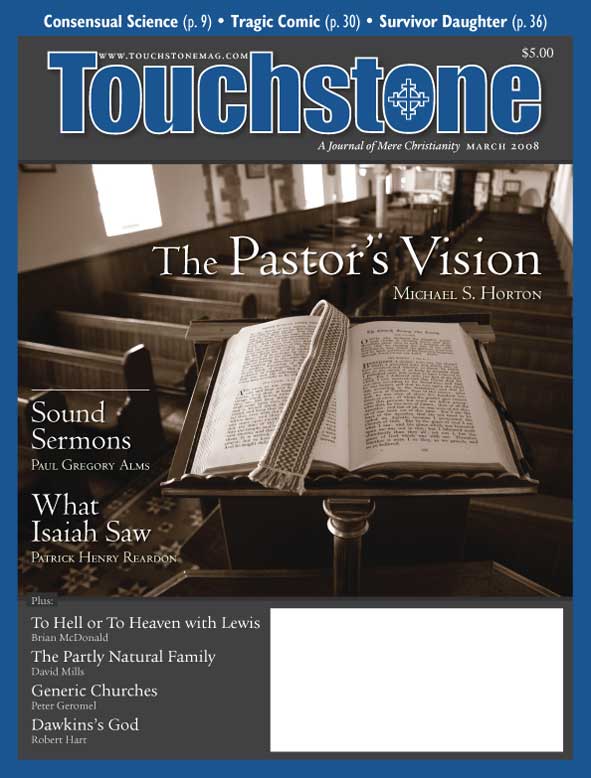Dawkins’s God
Robert Hart on a Famous Atheist Who (Almost) Sounds Like Augustine
If Richard Dawkins wants to refute what Christians believe, he should not declare his own belief in Divine Transcendence. Time magazine asked him and Francis Collins, a Christian who heads the Human Genome Project, what caused the universe to exist. The interviewer suggested that the answer could be God.
“There could be something incredibly grand and incomprehensible and beyond our present understanding,” Dawkins said. To this Collins responded, “That’s God.” Yes, said Dawkins,
but it could be any of a billion Gods . . . the chances of its being a particular God, Yahweh, the God of Jesus, is vanishingly small—at least the onus is on you to demonstrate why you think that’s the case. . . . I don’t see the Olympian Gods or Jesus coming down and dying on the cross as worthy of that grandeur. They strike me as parochial. If there’s a God, it’s going to be a whole lot more incomprehensible than anything that any theologian of any religion has ever proposed.
A Fact to Consider
How is this an argument against the Christian faith? (By the way, what does Dawkins mean by “our present understanding”? Does he anticipate some future state of exaltation and glorification that will increase it?)
In the Bible we read of God who dwells in the darkness and of God hidden by the radiance of blinding light. St. Paul writes of “the blessed and only Potentate, the King of kings, and Lord of lords; who only hath immortality, dwelling in the light which no man can approach unto; whom no man hath seen, nor can see” (1 Tim. 6:15–16).
In the first of his Soliloquies, St. Augustine writes of God as “incredibly grand.” The entire tradition of apophatic theology is about God who is beyond our understanding. God is spoken of in negatives, because we cannot know the Nature that is wholly other than every created nature, infinite, without beginning or end.
Dawkins believes that “the chances of its [this incomprehensible God] being a particular God . . . is vanishingly small.” Yet the Transcendent and incomprehensible God beyond our knowing, whose possible existence he concedes, is a particular God, and quite in keeping with the one element that he actually brings into question: Have we been given the complement of the divine mystery, namely, revelation? He thinks not, because God, if there is a God, is so infinitely distant from us.
Theology is, though many may find this astonishing, a science. It is based on statements of fact, including miracles. The Christian faith takes its stand on one thing above all, the eyewitness accounts of those who saw the resurrected Christ.
These are strengthened in their status as actual history by the martyrdom of the earliest witnesses. What stands as a unique event in history is not merely an empty tomb, and not the story of the Resurrection, but the deep conviction of the earliest Christians that Christ’s post-resurrection appearances were events real enough to die for.
This provides for us a fact to consider, namely, the faith of the Church. Here the chance that we have, not only a particular God, but specific revelation, is the opposite of “vanishingly small.” Instead, it is quite substantive on the basis of evidence.
In terms of this revelation, the post-resurrection appearances verify the teachings of Jesus, as recorded by eyewitness accounts, and lead to our central doctrine, the Incarnation. Dawkins fails in his attempt to criticize Christian teaching because he describes the very opposite of what we believe.
“I don’t see the Olympian Gods or Jesus coming down and dying on a cross, as worthy of that grandeur,” he tells the magazine. Here we can sympathize with him, because some theologians have made too much of St. Paul’s use of the Greek word kenoo to mean that Jesus “emptied himself” into human nature.
Taken Up in Christ
Never has the Church taught it this way. Always, the revelation has been understood to be that Jesus Christ is God the Word (Logos), or God the Son, having taken finite human nature into his infinite being, time into eternity, mortality into life, created nature into uncreated Person, the known into the unknowable. “God was made man that man might become God,” as St. Athanasius wrote in his On the Incarnation.
Dawkins is right to say that the idea of a knowable and definable god leaping down from Mt. Olympus is not worthy to be compared to this revelation. It is the very opposite. He is wrong to think of Jesus as an Olympian God. Jesus is the very opposite.
Although Dawkins means his estimation of the crucifixion of Christ as unworthy of divine grandeur to be a crushing criticism of Christianity, it is simply an echo of St. Paul’s words. “For the Jews require a sign, and the Greeks seek after wisdom: But we preach Christ crucified, unto the Jews a stumbling block, and unto the Greeks foolishness; but unto them which are called, both Jews and Greeks, Christ, the power of God, and the wisdom of God. Because the foolishness of God is wiser than men; and the weakness of God is stronger than men.” (1 Cor. 1:22–25).
Unworthy of divine grandeur indeed; that was the point.
Robert Hart is rector of St. Benedict's Anglican Catholic Church in Chapel Hill, North Carolina (Anglican Catholic Church Original Province). He also contributes regularly to the blog The Continuum. He is a contributing editor of Touchstone.
subscription options
Order
Print/Online Subscription

Get six issues (one year) of Touchstone PLUS full online access including pdf downloads for only $39.95. That's only $3.34 per month!
Order
Online Only
Subscription

Get a one-year full-access subscription to the Touchstone online archives for only $19.95. That's only $1.66 per month!
bulk subscriptions
Order Touchstone subscriptions in bulk and save $10 per sub! Each subscription includes 6 issues of Touchstone plus full online access to touchstonemag.com—including archives, videos, and pdf downloads of recent issues for only $29.95 each! Great for churches or study groups.
Transactions will be processed on a secure server.
more from the online archives

23.6—November/December 2010
Darwin, Design & Thomas Aquinas
The Mythical Conflict Between Thomism & Intelligent Design by Logan Paul Gage
calling all readers
Please Donate
"There are magazines worth reading but few worth saving . . . Touchstone is just such a magazine."
—Alice von Hildebrand
"Here we do not concede one square millimeter of territory to falsehood, folly, contemporary sentimentality, or fashion. We speak the truth, and let God be our judge. . . . Touchstone is the one committedly Christian conservative journal."
—Anthony Esolen, Touchstone senior editor








